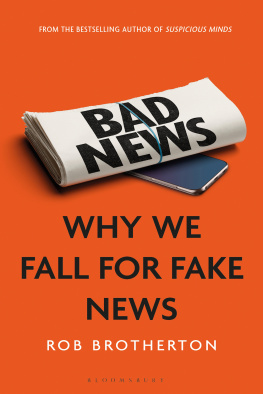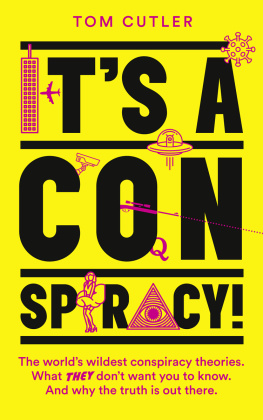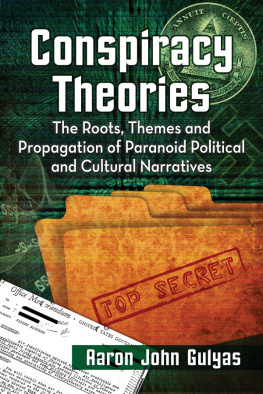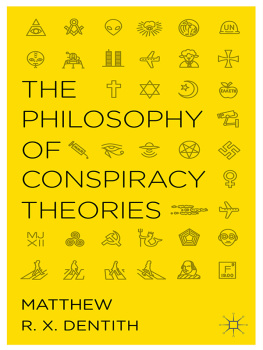Suspicious Minds
For Lindsay
Suspicious Minds
WHY WE BELIEVE CONSPIRACY THEORIES
Rob Brotherton

Contents
ALL is not as it seems. There is a hidden side to reality, a secret realm buzzing with clandestine activity and covert operations. This invisible network constantly screens, sifts, and manipulates information. It conjures up comforting lies to hide the real, bewildering truth. It steers what we think and believe, even shapes the decisions we make, molding our perception to its own agenda. Our understanding of the world, in short, is an illusion.
Who is behind this incredible scheme? Some sinister secret society? Psychopathic bureaucrats in smoke-filled boardrooms? The Queen of England? The intergalactic shape-shifting lizards who she works for? All of the above?
No. This is an inside job. Its not them its us . More specifically, its you. More specifically, its your brain.
Everything Is a Conspiracy
Theres a conspiracy theory for everything. Ancient Atlanteans built the pyramids. Abraham Lincoln was assassinated on the orders of his vice president, Andrew Johnson. The Apollo moon landings were filmed on a sound stage in Arizona. Area 51 is home to advanced technology of alien origin. Alex Jones, a conspiracy-minded radio host based out of Austin, Texas, is actually the alter-ego of comedian Bill Hicks (who faked his death in the early 1990s to pursue a career in conspiracism). And then theres Big Pharma, black helicopters, the Bilderberg Group, Bohemian Grove...
The rabbit hole runs deep. The conspiracy allegedly extends to the air we breathe (tainted by chem-trails), the food we eat (monkeyed with by Monsanto), the medicine we take (filled with deadly toxins), and the water we drink (spiked with mind-warping fluoride). Elections are rigged, politics is a sham, and President Obama is a communist Muslim from Kenya.
These are a few of the theories , but who are the theorists ? According to clich, conspiracy theorists are a rare breeda small but dedicated lunatic fringe of basement-dwelling, middle-aged men, intelligent outsiders with an idiosyncratic approach to research (and, often, a stockpile of Reynolds Wrap).
Most elements of the stereotype, however, dont hold up. On the whole, women are just as conspiracy-minded as men. Education and income dont make much difference either. The ranks of conspiracy theorists include slightly more high school dropouts than college graduates, but even professors, presidents, and Nobel Prize winners can succumb to conspiracism. And conspiracy theories appeal to all ages. Senior citizens are no more or less conspiracy-minded than Millennials, on average. At the low end of the age bracket, legions of American teens suspect that Louis Tomlinson and Harry Styles of the inordinately popular boy band One Direction are secretly an item, and that the bands corporate overlords invented a fake girlfriend for Louis as part of the cover-up.
As for the idea that conspiracy theories are a fringe affair, nothing could be farther from the truth. All told, huge numbers of people are conspiracy theorists when it comes to one issue or another. According to polls conducted over the last decade or so, around half of Americans think their government is probably hiding the truth about the 9/11 attacks. Almost four in ten suspect that climate change is a scientific fraud. Something like a third believe the government is likely hiding evidence of aliens. More than a quarter are worried about the New World Order. In a 2013 survey, 4 percent of the people polled (which, extended to the entire population of the United States, would mean twelve million people) said they think shape-shifting reptilian people control our world by taking on human form and gaining political power to manipulate our societies. A further 7 percent said they just werent sure.
These sorts of public opinion polls, its worth bearing in mind, only provide a rough indication of any particular theorys popularity. Estimates vary depending on exactly who you ask, how you ask them, and when. But this much is crystal clear: There are more conspiracy theorists out there than you might expect. Chances are you know some. Chances are you are one.
Its not just Americans. People in the United Kingdom and Europe are similarly suspicious. And its not just Westerners. Conspiracism is a global phenomenon. According to a 2011 Pew Research Center survey, between half and three quarters of people in various Middle Eastern countries doubt that Arab hijackers pulled off the 9/11 attacks. In many parts of the world, vaccines and other Western medicines are viewed with suspicion. Four out of ten Russians think that America faked the moon landings, according to a 2011 poll. In India, shortly after the countrys prime minister, Indira Gandhi, was assassinated in 1984, her successor told an audience of a hundred thousand people gathered in New Delhi, the assassination of Indira Gandhi is the doing of a vast conspiracy whose object is to weaken and divide India. And in Brazil, a popular conspiracy theory asserts that the American military is planning to invade the Amazon rain forest and take control of its rich natural resources. As part of the propaganda campaign to prepare American citizens for the impending invasion, the theory goes, maps of South America in American junior high school textbooks show a huge swath of the Amazon under the control of the United Nations.
So, was there a gunman on the Grassy Knoll? Is Elvis alive, relaxing by the pool with Jim Morrison, Marilyn Monroe, and Princess Diana in some secret resort for aggressively reclusive stars? Who really rules the world, and what did they do with flight MH370?
If youre looking for answers to these questions, then Im afraid youve picked up the wrong book. The truth might be out there, but its not in here. If there really are sinister schemes taking shape behind closed doors at this very moment, if the real perpetrators of atrocities have not yet been brought to justice, if everything we think we know is a lieitd be nice to know. But there are plenty of other books dedicated to compiling evidence of some alleged conspiracy, and almost as many books that purport to tear the theories to shreds. Thats not what this one is about. In fact, this book isnt really about conspiracy theories at all (though well encounter plenty of theories along the way). Its about conspiracy thinking about what psychology can reveal about how we decide what is reasonable and what is ridiculous, and why some people believe things that, to other people, seem completely unbelievable.
Of course, if you ask someone why they believeor why they dont believesome theory or other, theyll probably tell you its simple: Theyve made up their mind based on the evidence. But psychology tells a different story. It turns out that were not always the best judge of why we believe what we believe.
Tidy Desk, Tidy Mind (or: The Unexpected Virtue of Neatness)
In a recent experiment, psychologists at the University of Amsterdam had students think about something that they felt ambivalent aboutany topic about which they had both positive and negative feelings. Imagine, for instance, eating an entire tub of ice cream. It would be a nice way to spend twenty minutes, but itd also be pretty bad for you in the long run. You know there are pros and cons. Thats ambivalence.
Each student sat at a computer, thought about whatever it was that made him or her feel ambivalent, and typed up a few of the pros and cons. At that point, an error message appeared on the screen. Fear notit was all part of the psychologists devious plan. The researcher monitoring the experiment feigned surprise, and told the participant that they would have to complete the next (ostensibly unrelated) questionnaire at a different desk. The unwitting subject was led to a cubicle across the room, where they encountered a desk in disarray, strewn with pens, books, magazines, and crumpled pieces of paper. Then, nestled comfortably amid the detritus, the participant was shown a series of pictures.














